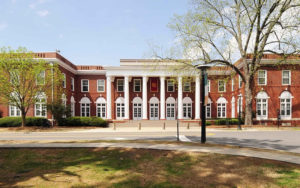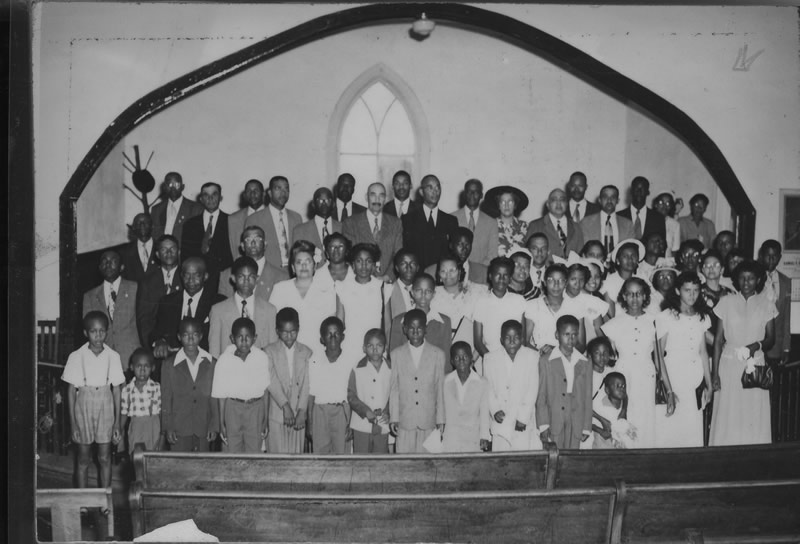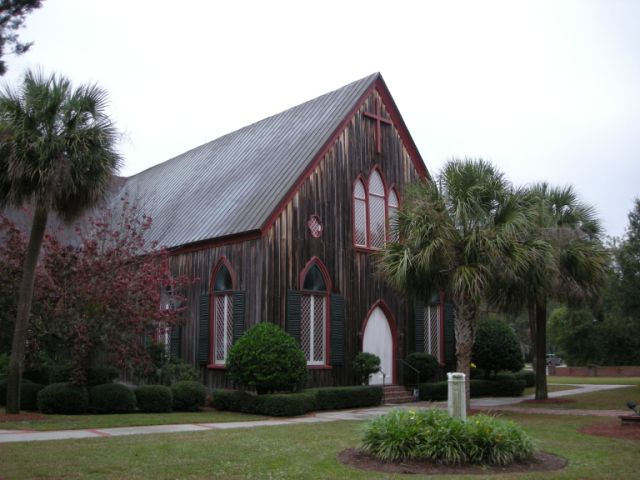NEWS BRIEFS: S.C. has fewer hungry children, what federal tax cuts in S.C. look like, more
COMMENTARY, Brack: Use smarter tools to be tough on trade
SPOTLIGHT: WREN
MY TURN, DeMint: S.C. needs coherent vision for future
FEEDBACK: A whopping understatement!
MYSTERY PHOTO: We’re pretty sure this is a church, but where?
S.C. ENCYCLOPEDIA: Briggs v. Elliott
EDITOR’S NOTE: This week’s edition is abbreviated so that we could enjoy more of the Fourth of July holiday.
NEWS BRIEFS
S.C. has fewer hungry children, what federal tax cuts in S.C. look like, more

By Lindsay Street, Statehouse correspondent | South Carolina is bucking the worsening national trend of food insecurity among children, according to a new report from the Brookings Institute.
South Carolina and Colorado are the only states in the nation to see fewer children facing food insecurity during 2014-16 compared to 2005-07. Still, the Palmetto State has 16.4 percent of children labeled as food insecure. The national average is 16.5 percent. The U.S. Department of Agriculture defines food insecurity as a lack of consistent access to sufficient food or quality food.
The research finding those numbers doesn’t point to any reason for success for the two outlier states. Here is an excerpt:
“In only two states – Colorado and South Carolina – were the share of children living in households with food insecurity and very low food security lower in 2014-16 than in 2005-07. In 23 states the share of children living in food insecure households was statistically significantly higher than just prior to the Great Recession.”
In other recent news:
Alford to retire. S.C. Department of Social Services Director Susan Alford has announced she will retire from the position effective July 16. Appointed by Gov. Nikki Haley, Alford has led the agency since 2014. Agency Chief of Staff Joan Meacham will serve as acting director when Alford retires, according to WLTX.
The Trump tax cut. If you make more than $200,000 in South Carolina, prepare for a federal windfall equivalent to the average annual salary of an ambulance driver in the state. A new calculator from The Tax Foundation shows the average tax cut via income and congressional district. For example, in South Carolina’s First District, a person making between $50,000 and $75,000 will receive a tax cut of $1,349 while a person making more than $200,000 in that same district will receive a tax cut of $24,819. See the calculator here.
Rate cuts happen. After the legislature finally got on the same page to force a 15 percent rate cut for South Carolina Electric & Gas customers (and then overrode a gubernatorial veto), the state’s utility oversight commission voted unanimously this week to enact the rate cut. SCE&G customers have been paying an 18 percent surcharge to help pay for a $9 billion now-defunct project that sought to bring two new nuclear reactors online at V.C. Summer in Jenkinsville. The project was canceled last year before being completed.
Minority affairs. The South Carolina Commission for Minority Affairs (CMA), which is supposed to conduct research and collect data to help the state better serve minority communities, has been under fire for months as a legislative audit probed its effectiveness. The audit came out this week and one of the biggest findings was that the CMA did not set up a hotline to receive reports of violations of immigration laws . Lawmakers are asking the governor to fire its board. Read more here.
Opportunity incentives. U.S. Sen. Tim Scott was in rural South Carolina this week touting the Opportunity Zones established by the federal tax overhaul last year. He said the tax incentives intended to lure economic development to rural communities throughout the nation could help spur growth in places lagging behind. Read the story here.
Police city USA. Myrtle Beach has second highest police per capita rate in the nation, according to a new report by Governing. With a rate of 68.7 police officers per 10,000 people, Myrtle Beach was only surpassed by Atlantic City, N.J. (70.9). In South Carolina, the next highest officer-per-capita rate is in Anderson with 33.1 officers per 10,000 people. The lowest was in Goose Creek at 15.2 officers per 10,000 people. Read the report.
- Have a comment? Send to: feedback@statehousereport.com
BRACK: Use smarter tools to be tough on trade

By Andy Brack, editor and publisher | President Donald Trump is the bully in the China shop of global trade. If a new trade war sparked by tariffs on goods from China, Canada, Mexico and our European allies continues, South Carolinians will lose jobs – lots of jobs.
 “The South Carolina economy is placed at high risk in the current tough talk about trade,” said economist C. Bruce Yandle, dean emeritus of the Clemson University College of Business and Behavioral Science. “Far more international than the national economy, South Carolina has export-supported jobs that reach across the entire state. Making matters even more difficult, China is the top destination for S.C. exports, followed by Germany, Canada and Mexico.”
“The South Carolina economy is placed at high risk in the current tough talk about trade,” said economist C. Bruce Yandle, dean emeritus of the Clemson University College of Business and Behavioral Science. “Far more international than the national economy, South Carolina has export-supported jobs that reach across the entire state. Making matters even more difficult, China is the top destination for S.C. exports, followed by Germany, Canada and Mexico.”
A new study by the U.S. Chamber of Commerce suggests South Carolina, which has worked hard for years to attract foreign investment to beef up its economy, stands to be the eighth-most affected state from retaliatory tariffs by China, Canada, Mexico and our European allies. The study says $3 billion in exports, many shipped through the port of Charleston, are threatened by a trade war.
That could raise the costs of doing business, which would impact workers at big plants, such as those building Boeing jets in North Charleston or BMW vehicles in Greer – and future vehicles from a new Lowcountry facility being built by Volvo, a Swedish brand actually owned by the Chinese company Geely.
“If you have trade barriers and restrictions, we cannot create as many jobs as we are planning to,” Volvo’s CEO said last month.
A tariff escalation likely would have huge ripple effects, too, costing jobs down the supply chain as smaller companies don’t get as many orders from the big companies. If laid-off workers are lucky enough to find lower-paying jobs, they would not have as much spending money to patronize local shops and restaurants, causing them to feel the pinch. Churches would see less money in Sunday collection plates. The state’s economy would slow down and unemployment would rise.
 “State officials have bragged correctly that the big manufacturers they have enticed to locate in South Carolina also brought more business opportunities for our existing and new small businesses,” said Frank Knapp, president and CEO of the S.C. Small Business Chamber of Commerce. “However, the Trump Administration’s self-inflicted tariff war will be a disaster for our state’s small businesses that were told to export and that are dependent on our exporting-manufacturers for survival.
“State officials have bragged correctly that the big manufacturers they have enticed to locate in South Carolina also brought more business opportunities for our existing and new small businesses,” said Frank Knapp, president and CEO of the S.C. Small Business Chamber of Commerce. “However, the Trump Administration’s self-inflicted tariff war will be a disaster for our state’s small businesses that were told to export and that are dependent on our exporting-manufacturers for survival.
“While big and multinational companies will survive largely because of the 40 percent corporate tax rate cut approved by Congress last December, 90 percent of our small businesses are not corporations and received very little benefit from the GOP tax reform. These small businesses are going to suffer greatly due to the tariff war and possibly not survive at all.”
Trump’s billions of dollars in newly-implemented tariffs, now countered by billions of retaliatory tariffs by China and other countries, is an economic doomsday scenario for the Palmetto State. It’s not going to force bad trade actors – China in particular – to make lots of change in how they do business. Why? Because tariffs are too broad, risky and old-school for that kind of result.
Instead, the United States needs to use more surgical trade tools to force change. We should use other trade tactics and strategies, such as curbing U.S. access to counterfeit goods, cutting theft of American ingenuity, updating our own antitrust and foreign investment laws, and stopping scientific and technical cooperation (i.e., opening our research and development efforts) to bad trade actors.
“What is being talked about [tariffs] is an approach that would broadly affect the state and ultimately would affect production in the state,” said Ted Pitts, president and CEO of the S.C. Chamber of Commerce. “We need for our federal delegation to take time and understand impacts and express their concerns with the administration.”
Tariff advocates may point out that China, in particular, has been playing the United States for Uncle Sucker for years. It has undercut prices to get market share. It has different working standards to lure production in China and it outright steals American intellectual property.
But throwing an international tantrum with the jobs of South Carolina workers as sacrificial lambs is the ultimate in economic irresponsibility. There are smarter ways to be tough on trade.
- Have a comment? Send to: feedback@statehousereport.com.
SPOTLIGHT
SPOTLIGHT: WREN
 The Women’s Rights and Empowerment Network (WREN) is a South Carolina-based nonpartisan network created to build a movement to advance the health, economic well-being, and rights of South Carolina’s women, girls, and their families. WREN provides a strong, collective voice for South Carolina’s women and girls.
The Women’s Rights and Empowerment Network (WREN) is a South Carolina-based nonpartisan network created to build a movement to advance the health, economic well-being, and rights of South Carolina’s women, girls, and their families. WREN provides a strong, collective voice for South Carolina’s women and girls.
With its partners and members:
WREN advocates at the Statehouse for policies and laws that will improve the status of women.
WREN educates the public on issues that affect women and girls and seeks to inspire action.
WREN empowers people and strengthens organizations to support women and young people.
WREN builds coalitions of people and organizations committed to improving opportunities in South Carolina.
WREN convenes diverse voices, collects and disseminates research, and shares information about practical solutions to promote gender equality and improve our state’s health and economic vitality.
- To learn more, visit WREN online at: http://www.scwren.org
DEMINT: S.C. needs coherent vision for future

By Jim DeMint, republished with permission | It’s no secret. South Carolina is bursting with promise. Our breathtaking natural beauty, low cost of living, friendly culture and hard-working people have led to rapid growth in recent years.
But even as we celebrate all that’s good about our state, we must also acknowledge that we face daunting barriers to opportunity that hold our people back from reaching their full potential.
Opportunity is squandered every day as our state government, mired in inertia, incompetence (and sometimes outright corruption) staggers from one crisis to the next. Sadly, the diffuse accountability of our legislatively-dominated system is a barrier to creating a coherent vision for the future.
For example, what is the plan to improve education? Lower taxes? Fix roads? There is none.
Our outdated education system leaves far too many children without the skills they need to succeed in life. Our uncompetitive tax code “necessitates” huge giveaways to attract out of state companies and sticks homegrown businesses with the bill. Despite a massive gas tax hike, our crumbling infrastructure still has no transparent, prioritized strategic plan.
And then there’s the $9 billion V.C. Summer nuclear boondoggle, a vivid example of Columbia’s gaping public policy vacuum. In the absence of credible, independent analysis, part-time legislators with few staff are left to rely on information from cronies and insiders who write legislation that benefits their bottom line…and leave the rest of us picking up the tab.
But as a proud South Carolinian, “While I breathe, I hope.” In each of these challenges, I see tremendous opportunity for us to unite to overcome our challenges and lead a national opportunity revolution.
It starts with bold, proven ideas. We can’t just elect good people and send them into battle armed with nothing but good intentions. We need powerful “idea engines” to map out real solutions, crunch data, learn from other states, convene the right allies and craft the right messages to move reform forward.
Enter Palmetto Promise Institute’s Freedom Agenda, a roadmap to fairness and opportunity for every citizen in our state:
 Education Freedom means parent-controlled innovations like Education Scholarship Accounts that enable students to completely customize a K-12 education experience that meets their unique needs. It also means fixing South Carolina’s broken funding formula to get dollars out of programs and bureaucracies and down into classrooms to support teachers and students.
Education Freedom means parent-controlled innovations like Education Scholarship Accounts that enable students to completely customize a K-12 education experience that meets their unique needs. It also means fixing South Carolina’s broken funding formula to get dollars out of programs and bureaucracies and down into classrooms to support teachers and students.
Tax Freedom entails fundamentally reforming our unfair, unstable and uncompetitive tax code by following the tried and true pro-growth principles of a broad base and lower rates. Our neighbors in North Carolina have already done just that and are reaping the benefits. With the highest marginal individual income tax rate in the Southeast, South Carolina simply can’t afford to get left behind.
Energy Freedom starts with cleaning up the V.C. Summer mess by putting South Carolina on a path to get out of the failed, state-owned energy business and allowing for more energy choice like our neighbors in Georgia enjoy.
Healthcare Freedom protects growing innovations like Direct Primary Care that provide transparency in pricing and put doctors and patients – not insurance companies – back in charge of health care decisions. It also means continuing to push Washington away from one-size-fits-all regulation of our insurance market. With Medicaid growth unchecked and crowding out other budget priorities, we must seek new ways to reform this broken program to both rein in costs and better serve the truly vulnerable.
Each of these ideas draws from the practical experience of states across the country, while harnessing independent, data-driven research to customize them to the unique needs of South Carolina. Each of these solutions is grounded in the principles of freedom and opportunity which have been the lifeblood of American greatness. And each of these reforms stand up for the little guy or gal being crushed under the weight of our broken state government.
During my time in Washington I quickly learned that old ways of doing business die hard. But as we proved in the successful fight to eliminate earmarks, change is possible. Even in this age of negativity and division, I believe strong, principled leaders can unite people to move a bold, positive Freedom Agenda forward.
Our battle cry: give us a Palmetto State that is free and fair, where every individual has an opportunity to reach their full, God-given potential. That’s the only path to a happier, healthier, more prosperous South Carolina.
Former U.S. Sen. Jim DeMint, R-S.C., is the founding chairman of Palmetto Promise Institute.
- Have a comment? Send it to: feedback@statehousereport.com.
FEEDBACK
FEEDBACK: A whopping understatement
To the editor:
![]() Regarding “S.C. worker shortage in hospitality nears ‘crisis stage,’ experts say,” Lindsay Street wrote, “Blackwell said there is a cure for any industry struggling to recruit and retain: better incentives, including paying workers more.”
Regarding “S.C. worker shortage in hospitality nears ‘crisis stage,’ experts say,” Lindsay Street wrote, “Blackwell said there is a cure for any industry struggling to recruit and retain: better incentives, including paying workers more.”
“Including?” Wow, that’s the understatement of the 21st Century!
This pap sounds like feel-good management fads foisted on us middle managers in the 1990s. We all were showered with seminars about “non-monetary motivators” ad nauseum.
These fads rationalized not paying the people who do the work sufficiently, so that the 1 percent could gorge on ever-greater portions of revenues without cutting share prices.
Training and better conditions and team building and all of those anything-other-than-decent-pay factors do have value in select circumstances. However:
- Non-pay “incentives” don’t mean squat if you don’t pay people enough to live.
- Those at low skill and educational levels often don’t understand or care about intangibles. They’re virtually all Myers-Briggs “S” types. They don’t think the way college professors do, no matter what high-minded theory-of-the-week that college professors spout.
This MBA is tired of platitudes. In a tight labor market: Quit giving bargain rates to the elite who are served by the masses, or the masses won’t show up to serve the elite. Share the wealth or take the consequences. Adam Smith described how this works back in 1776. Henry Ford showed how well it works.
— James E. “Jimmy” Mahone, Seneca, S.C.
Send us your thoughts. We love hearing from our readers and encourage you to share your opinions. But you’ve got to provide us with contact information so we can verify your letters. Letters to the editor are published weekly. We reserve the right to edit for length and clarity. Comments are limited to 250 words or less. Please include your name and contact information.
- Send your letters or comments to: feedback@statehousereport.com
MYSTERY PHOTO
MYSTERY PHOTO: We’re pretty sure this is a church, but where?
This is a distinctive building, but what and where in South Carolina is it? Send your best guess – plus your name and hometown – to feedback@statehousereport.com. In the subject line, write: “Mystery Photo guess.” (If you don’t include your contact information, we can’t give you credit!)
Our previous Mystery Photo
 Our June 29 mystery pictured a classic building with a great presence. Where was it? If you guessed Johnson Hall Theatre at Winthrop University, you were correct!
Our June 29 mystery pictured a classic building with a great presence. Where was it? If you guessed Johnson Hall Theatre at Winthrop University, you were correct!
Congratulations to those who correctly identified the 1920 building designed along classic lines:
Winthrop graduate Ashley Aldebol of Irmo; George Graf of Palmyra, Va.; and Lexie Chatham of West Columbia. Graf provide a bit more context:
“According to winthrop.edu, Johnson Hall, named for founding president David Bancroft Johnson, was constructed with funds from oil magnate and philanthropist John D. Rockefeller, the YWCA, and the state legislature. Built in the Classical Revival style, it originally housed offices for students, the YWCA, and literary societies. The building was renovated and expanded in 1993 and remains one of the premier performance facilities in the South.”
Send us a mystery: If you have a photo that you believe will stump readers, send it along (but make sure to tell us what it is because it may stump us too!) Send to: feedback@statehousereport.com and mark it as a photo submission. Thanks.
S.C. ENCYCLOPEDIA
HISTORY: Briggs v. Elliott

S.C. Encyclopedia | Briggs v. Elliott was one of five cases, collectively entitled Brown et al. v. Board of Education of Topeka, Shawnee County, KS, et al., argued before the United States Supreme Court on December 9–11, 1952, and December 7–9, 1953, by attorneys from the National Association for the Advancement of Colored People (NAACP). The historic decision of Brown v. Board of Education rendered the doctrine of “separate but equal” public education unconstitutional and led to the movement to desegregate public schools throughout the United States. Originally a lawsuit filed by twenty African American parents in Clarendon County for equal educational opportunities for their children, Briggs v. Elliott was the first case in the 20th century to challenge the constitutionality of racially segregated schools. The case carries the names of the lead plaintiff, Harry Briggs, who had five children in the school district, and Roderick W. Elliott, chairman of School District 22.
Ironically, the plaintiffs in the case that eventually became the Briggs case just wanted the Clarendon County school board to provide a school bus for their children. Some African American children had to ford or row across a stream (when it was flooded) and then walk an additional nine miles in order to attend Scott’s Branch School in Summerton. Others had to walk at least five miles one way to attend the school. After a young boy drowned in the newly created Lake Marion reservoir, which separated several African American communities from the school, in 1948 Reverend Joseph Armstrong De Laine, a minister of the African Methodist Episcopal Church, urged a local African American farmer, Levi Pearson, to sue for a school bus. The case, Levi Pearson v. Clarendon County and School District No. 26, was filed by NAACP attorney Harold Boulware of Columbia. The case was withdrawn, however, when it was discovered that Pearson’s residence straddled the county line and that he paid taxes in a different district.
Subsequently, De Laine and Boulware met with attorneys from the NAACP’s national office to request support for another case challenging the school board’s refusal to provide African American children with transportation. At first the NAACP’s chief legal counsel, Thurgood Marshall, turned down their request. But he changed his mind and decided to support another challenge if De Laine would obtain 20 petitioners from the Clarendon County community to support a case to equalize all aspects of education for African American children—including facilities, teachers’ salaries, books, and supplies—as well as transportation.
Marshall agreed to represent the plaintiffs because their case represented an opportunity for the NAACP to continue its campaign against unequal, segregated education for African Americans in the southern states. The campaign, which began in 1935 under the leadership of the NAACP’s first chief legal counsel, Charles Hamilton Houston, had developed as a three-pronged strategy to improve African American education in the South. First, Houston wanted to ensure that African American teachers in the southern states received salaries equal to those of white teachers. Second, he wanted to ensure that the southern states provided transportation for African American students to and from their schools. Third, he wanted to ensure that the southern states provided graduate and professional education and training for African American students. Houston’s strategy was based on using the “separate but equal” doctrine established in the 1896 Plessy v. Ferguson decision to force the southern states to provide African American students an education that was truly equal to that of white students. It did not challenge the doctrine directly or demand integration. From 1938 to 1948 Houston’s successor and former student Thurgood Marshall continued his strategy, but by the latter year he was ready for a full, frontal assault on the constitutionality of segregated schools.
In November 1950, Marshall presented the case of the 20 plaintiffs from Clarendon County to the federal district court in Charleston. During the pretrial hearing he was encouraged by federal judge J. Waties Waring of Charleston not to argue for a “separate but equal” education, or one that would only equalize African American schools in a segregated system. Judge Waring encouraged him instead to present a case arguing for schools for African American children that would truly be equal by asking for an end to segregation in the state’s public schools. Taking Waring’s advice, in May 1951 Marshall returned to the federal court and presented his case for ending segregation in the state’s public schools. He introduced evidence showing how the African American schools in Clarendon County were grossly unequal to those for whites in facilities, teacher-to-student ratios, class sizes, and expenditures per student. The attorneys representing the state of South Carolina sought to defuse this argument by announcing that Gov. James F. Byrnes was going to introduce a new sales tax to raise money to improve the state’s African American schools. But Marshall also presented testimony from the sociologist Kenneth Clark documenting the harmful effects of segregation on the lives and psyches of African American children in South Carolina. Arguing the case before a three-judge panel, which included Waring and two segregationists, Judges John J. Parker and George Bell Timmerman, Marshall lost the case. Only Judge Waring supported his argument and offered a dissenting opinion against segregated schools in South Carolina.
 The Briggs case was appealed to the United States Supreme Court, where it became part of the famous Brown case. NAACP attorneys Robert Carter and Thurgood Marshall argued the case on behalf of its South Carolina plaintiffs, while former U.S. solicitor general John W. Davis represented the state in its defense of its segregated school system. On May 17, 1954, the Supreme Court ruled in favor of the plaintiffs and declared, unanimously, segregation in public schools unconstitutional.
The Briggs case was appealed to the United States Supreme Court, where it became part of the famous Brown case. NAACP attorneys Robert Carter and Thurgood Marshall argued the case on behalf of its South Carolina plaintiffs, while former U.S. solicitor general John W. Davis represented the state in its defense of its segregated school system. On May 17, 1954, the Supreme Court ruled in favor of the plaintiffs and declared, unanimously, segregation in public schools unconstitutional.
Despite the case’s favorable outcome, its South Carolina plaintiffs suffered tremendous hardships for their decision to pursue justice for their children. Reverend De Laine was shot at, his house was burned to the ground, and he was eventually forced to flee the state. Harry Briggs, the lead plaintiff, lost his job as a gas station attendant. Levi Pearson, the plaintiff in the first attempt to obtain only a school bus, had his loans called in, and he had to watch his crops for 1948 rot in the fields because he could not rent the machinery to harvest them. Other plaintiffs and supporters of the case were harassed; fired from their jobs as teachers, matrons, and housekeepers; and kicked off the land of white landowners for whom they were sharecropping. Due to the designation of this landmark case as the “Brown case” or the “Brown decision” in American legal history, the sacrifices of these South Carolinians who filed the first major case to challenge the constitutionally of segregated schools have frequently been overlooked in the nation’s history books.
— Excerpted from an entry by W. Marvin Dulaney. To read more about this or 2,000 other entries about South Carolina, check out The South Carolina Encyclopedia, published in 2006 by USC Press. (Information used by permission.)
ABOUT STATEHOUSE REPORT
Statehouse Report, founded in 2001 as a weekly legislative forecast that informs readers about what is going to happen in South Carolina politics and policy, is provided to you at no charge every Friday.
- Editor and publisher: Andy Brack, 843.670.3996
- Statehouse correspondent: Lindsay Street
More
- Mailing address: Send inquiries by mail to: P.O. Box 22261, Charleston, SC 29407
- Subscriptions are free: Click to subscribe.
- We hope you’ll keep receiving the great news and information from Statehouse Report, but if you need to unsubscribe, go to the bottom of the weekly email issue and follow the instructions.
© 2018, Statehouse Report. All rights reserved.




Who wrote that message from Jim DeMint? It certainly wasn’t DeMint because it echoes none of the starve-the-poor ideas he espouses. That S.O.B. better not be thinking he can sneak back into public office. There’s a blue wave rising among South Carolina voters and it is going to drown rats like DeMint in November.